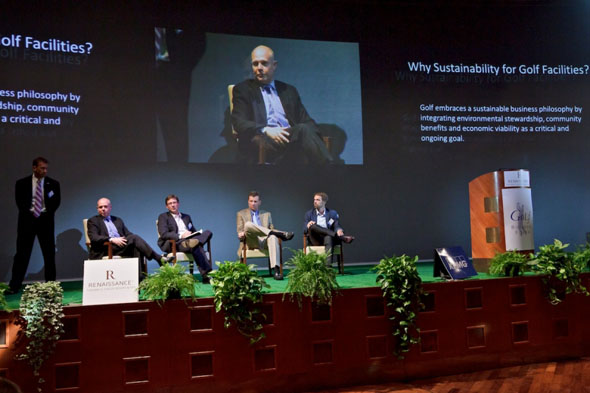KPMG Golf Business Forum Reflects the Importance of Sustainability & Innovation
September 26, 2012
Session 2 Return to the Mediterranean: Opportunities in emerging markets

The Second session focused on which countries where emerging as promoters of the game in the Mediterranean region.
Turkey were considered an emerging market, along with France with them hosting the Ryder Cup in 2018 but Spain retained its influence as the N0.1 hotspot in Europe for Golf Tourism. In North Africa, Morocco is the No1 in Africa with over 5,000 registered golfers. Sir Rocco Forte, Chairman of Rocco Forte Hotels added that Marakech was the most popular destination in North Africa.
But he also mentioned Tunisia as a up and comer in the Region. In the Adriatic Coast Slovenia have 8,496 golfers but Croatia are prominent as well. Now they have 10 Golf Courses licensed.
Zenon Eliades, CEO of Eliades Leisure, believes: “Golf tourist are coming from northern Europe. In Cyprus most tourist came from UK as well as western Europe. Recently Chinese buyers have arrived in Cyprus. But they buying lower prized products.”
Ivan Jakovcic, President of the Region of Istria, Croatia conveyed that the majority of his customers are from Austria and Slovenia. “We want to build courses which will improve the destination and Isteria.”
Ignacio Perez Diaz from the La Zagaleta Group in Spain, suggested the recession had affected the demand for Golf properties and creating resorts.
Session 3 – Sustainability

Stuart Robertson, a marketing consultant and the former marketing manager of the England and Wales Cricket Board looked at different ways of innovation by taking the Twenty20 model as an example. He suggested how they changed the traditional elements of the game after conducting many surveys. They made sure a new brand was created by keeping the name, branding and instead of having title sponsor they had official partners to keep the brand strong.
Session 3 Sustainability, Economic, Environmental and Social

Sustainability is paramount to the building of a golf course. Sustainability can help to save costs, improve branding and help manage the course.
Rhett Evans, CEO of GCSAA (Moderator) suggested players are very picky about playing conditions and is the biggest component for golfers selecting a course to play. Laurent Boissonnas, Managing Director of Open Golf Club added that “golfers want to play courses in the best conditions. Don’t really care about the sustainability.” But he also reiterated sustainability should be embraced as much as we can.
Gil Hanse: Rio2016, GOlf course designer, also revealed that Sustainability mattered in the final decision in the selection process. Design, Legacy and sustainability were the three components in the bidding process.
The trick was for the golf course had to challenge the best and be used after the Olympics. Hanse looked at sustainability especially the agriculture.
Asked during a debate on sustainability what the priorities for golf are, architect Gil Hanse, selected to design the course for the Rio 2016 Olympics, said: “It’s all about water. It may force the hand of green golf – and I mean the colour of our courses. We’ve heard that, in the future, wars will be about water rather than oil. Ultimately, that will be the war that the golf industry will have to fight – the availability of water and constant restrictions, it will eventually tip our hand. Until then, we have to make the delivery of water more efficient, that’s the war we can fight behind the scenes, but it will be difficult to change the minds of golfers.”
Mike Parkin also saw technology as an enabler of sustainability and It will create new jobs in different sectors.
Jonathan Smith, CEO of GEO added that he felt sustainability challenges Golf’s Status Quo. There is money in sustainability.
This session was ended with Hanse suggesting Water is the most important element of sustainability with water being restricted in the future. Will be difficult to change golfers minds.


